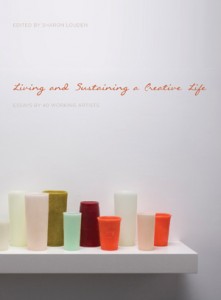[contextly_auto_sidebar id=”bf0FrQh0qNpnPUaXjMY1eGrcVaOQV5gc”]
IT’S never been easy to make a living as a creative being, and recent years have made it even more difficult for anyone without a trust fund. So I’m quite cheered by the recent appearance of a handsome, useful book, Living and Sustaining a Creative Life . Edited by the Brooklyn-based, Yale-educated artist Sharon Louden, it’s subtitled “Essays by 40 Working Artists.” (About half of them are based in New York.)
. Edited by the Brooklyn-based, Yale-educated artist Sharon Louden, it’s subtitled “Essays by 40 Working Artists.” (About half of them are based in New York.)
Part of what I like about the book (published by Chicago-based Intellect) is its balance between hard-headed pragmatism and idealism about the artist’s mission. It shares some concerns — the dangers of romanticism, the relationship of artists to the larger society — with my own upcoming book Culture Crash, though Louden’s book is more dedicated to seeking solutions.
Here’s my conversation with Louden.
Has the myth of the starving artist done damage to the way the public, and perhaps artists themselves, view the situation?
Did you hear about impact of the recession a lot? Are visual artists still feeling its sting?
What is the role of galleries and dealers in 2014?

I suppose I would fault the ‘one size fits all’ approach that’s implicit here. Also, the implication that if ‘we could just be better small businesspeople, all would be well’. Hate to tell you, but most small businesses fail.
My gut feeling is that there are many ways to skin the cat. One is a source of income unrelated to one’s artistic endeavors. The poets have known this for a century–think William Carlos Williams practicing medicine or Wallace Stevens slaving away in the insurance industry. Another is to figure out a way to make your creative talents pay in something related to your principal artistic thrust. Another is to be born unspeakably rich. Another is to have a well paid supportive partner (old country joke–behind every successful rancher there’s a woman with health insurance and a good job in town–sometimes the yokels nail it).
Basically, if your art is part of your life style, it’s unrealistic to expect your art to foot all the bills. And God help you if you start defining your artistic success, or the merit of your work, by its economic results. There be Thomas Kincaid.